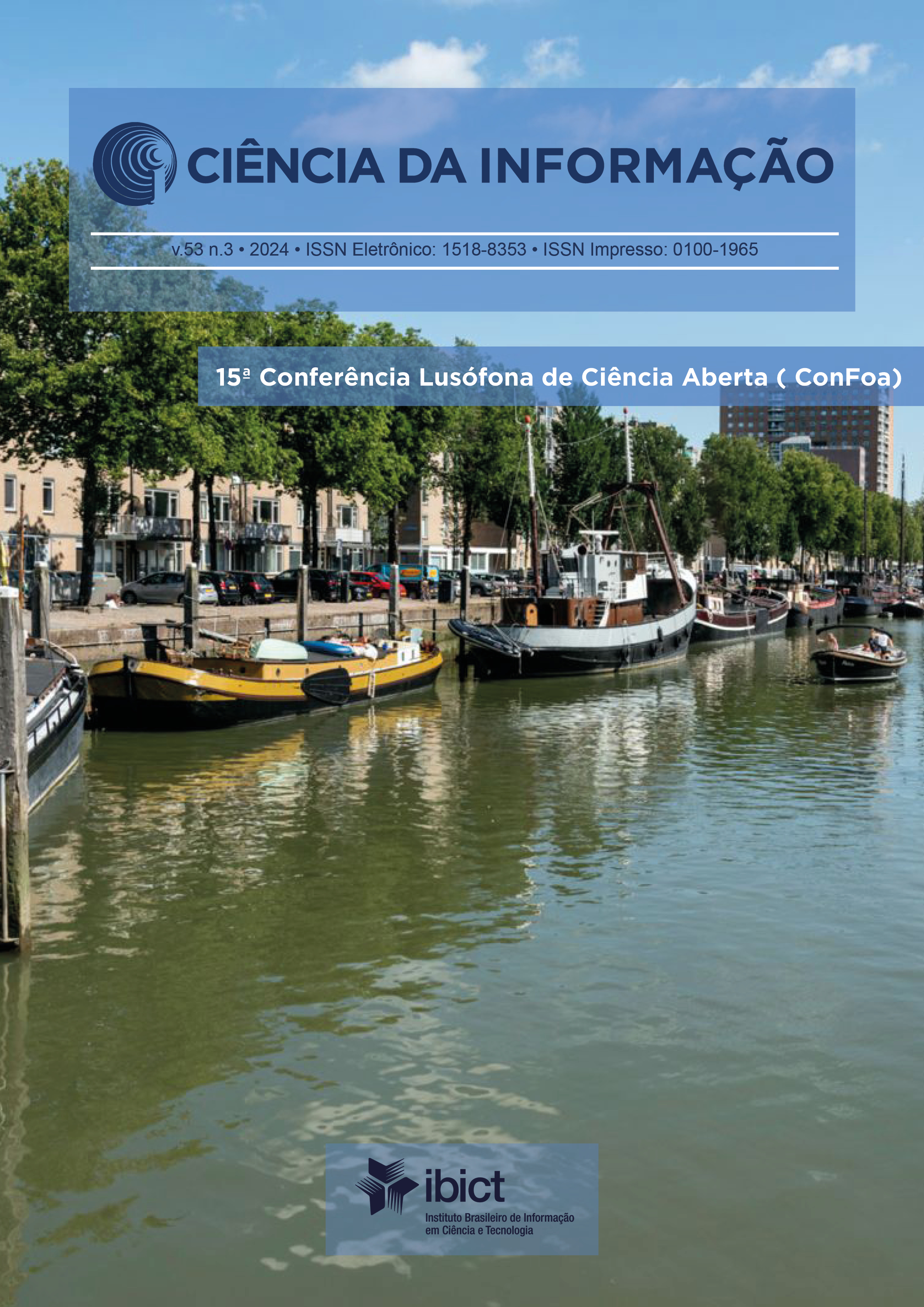Ciência Aberta e Inteligência Artificial
desafios éticos e transparência em modelos generativos
DOI:
https://doi.org/10.18225/ci.inf.v53i3.7227Keywords:
ciencia aberta, Inteligencia artificial, etica, transparenciaAbstract
O artigo aborda os desafios éticos e de transparência associados ao uso de Inteligência Artificial (IA) em alinhamento com os princípios da Ciência Aberta, com um foco especial nos modelos generativos, como o ChatGPT e Mistral. Utilizando uma metodologia que combina pesquisa documental e bibliográfica, o estudo examina tanto modelos de IA abertos quanto fechados, analisando como essas tecnologias podem distorcer a integridade científica. O objetivo central é fomentar um debate sobre as implicações dessas distorções e propor mecanismos para mitigar tais efeitos, reforçando a necessidade de modelos transparentes que assegurem a reprodutibilidade científica. Conclui-se que, quando aplicados com rigor ético, os modelos generativos têm o potencial de auxiliar significativamente a Ciência Aberta, promovendo um novo nível de colaboração e inovação no campo científico.
Downloads
References
Alkaissi, H., & McFarlane, S. I.. Artificial Hallucinations in ChatGPT: Implications in Scientific Writing. Cureus, 15(2), e35179. https://doi.org/10.7759/cureus.35179, 2023
Anthropic. Introduction to Claude. https://docs.anthropic.com/en/docs/intro-to-claude, 2024
Baronchelli, A. Shaping new norms for AI. Philosophical Transactions of the Royal Society B, 379(1897), 20230028. https://doi.org/10.1098/rstb.2023.0028, 2024
Bockting, C. L., van Dis, E. A., van Rooij, R., Zuidema, W., & Bollen, J. Living guidelines for generative AI—why scientists must oversee its use. Nature, 622(7984), 693-696. https://doi.org/10.1038/d41586-023-03266-1, 2023
Castelvecchi, D. Can we open the Black Box of AI? Nature, 538, 20-21. https://doi.org/10.1038/538020a, 2016
Clyde, A.. AI for Science and Global Citizens. Patterns, 3, 100446. https://doi.org/10.1016/j.patter.2022.100446, 2022
Grossmann, I., Feinberg, M., Parker, D. C., Christakis, N. A., Tetlock, P. E., & Cunningham, W. A. AI and the transformation of social science research. Science, 380(6650), 1108-1109. https://doi.org/10.1126/science.adi1778, 2023
Kocak, B., Yardimci, A. H., Yuzkan, S., Keles, A., Altun, O., Bulut, E., ... & Okumus, A. A. Transparency in artificial intelligence research: a systematic review of availability items related to open science in radiology and nuclear medicine. Academic Radiology, 30(10), 2254-2266. https://doi.org/10.1016/j.acra.2022.11.030, 2023
Lin Z. Why and how to embrace AI such as ChatGPT in your academic life. R. Soc. Open Sci.10: 230658.https://doi.org/10.1098/rsos.230658, 2023
Mistral AI. Open Weight Models. Mistral AI. https://docs.mistral.ai/getting-started/open_weight_models/, 2024a
Mistral AI. Fine Tuning. Mistral AI. https://docs.mistral.ai/guides/finetuning/. 2024b
Nguyen, Zooey, et al. Enhancing Q&A with Domain-Specific Fine-Tuning and Iterative Reasoning: A Comparative Study." arXiv preprint arXiv:2404.11792, 2024
OpenAI. OpenAI API Overview. https://platform.openai.com/docs/overview, 2024a
OpenAI. How ChatGPT and our language models are developed. https://help.openai.com/en/articles/7842364-how-chatgpt-and-our-language-models-are-developed. 2024b
Rockembach, M. Ciência da informação e inteligência artificial: um caminho para arquivos e bibliotecas inteligentes. In Congresso ISKO Espanha-Portugal: Organização do conhecimento no horizonte 2030 [recurso eletrônico]. Lisboa: Universidade de Lisboa, 2021
Rockembach, M., & Geerts, D. Eticista digital: uma função emergente no campo da Informação. Boletim do Arquivo da Universidade de Coimbra, 37(1), 75-93, 2024
Van Dis, E. A., Bollen, J., Zuidema, W., Van Rooij, R., & Bockting, C. L. ChatGPT: five priorities for research. Nature, 224-226. https://doi.org/10.1098/rstb.2023.0028, 2023
Downloads
Published
Issue
Section
License
Copyright (c) 2024 Moisés Rockembach

This work is licensed under a Creative Commons Attribution-ShareAlike 4.0 International License.
- This publication reserves the right to modify the original, regarding norms, spelling and grammar, in order to maintain the standards of the language, still respecting author writing style;
- The final proofs will not be sent to the authors;
- Published works become Ciência da Informação's property, their second partial or full print being subject to expressed authorization by IBICT's Director;
- The original source of publicaton must be provided at all times;
- The authors are solely responsible fo the views expressed within the article;
- Each author will receive two hard copies of the issue, if made availalbe in print.




























